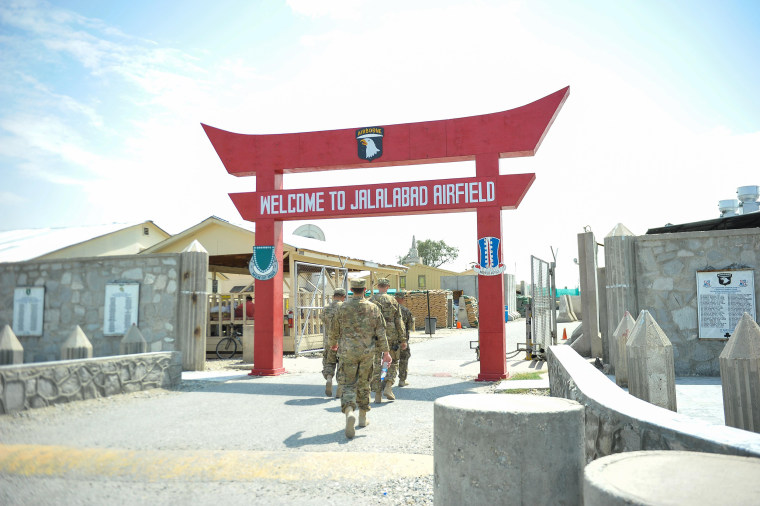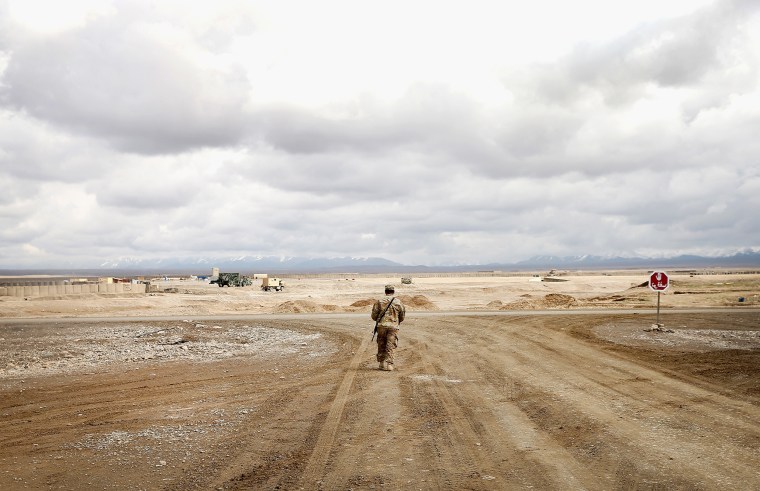Abdulla thought it was the opportunity of a lifetime.
After struggling to find work in his home country of Bangladesh, he said a recruiter offered him a chance to work in a restaurant thousands of miles away in Kuwait City for the equivalent of $660 a month.
There was a catch: He would have to pay a hefty fee — about $10,250 — but he figured it was worth it. He says his mother got loans to cover the fee and he flew to Kuwait in January 2016. He was 21.
Abdulla said he arrived to broken promises.
He would not be working in a restaurant. Instead, he says, the company that hired him, Tamimi Global Co., sent him to wash dishes at Camp Buehring, a U.S. Army base in Kuwait. He said his salary was about $260, less than half of what was promised, and he worked 12 hours a day with no days off for almost three years.
Abdulla, whose real name is being withheld because he fears retaliation, signed a contract and handed over his passport.
He was among about 400 workers, he said, who did the same.
“What can we do?” he said. “I missed my mom. I cried every day.”
Abdulla is one of thousands of people allegedly trafficked into labor by private contractors on U.S. military bases — where workers have been paid less than promised, charged recruiting fees that leave them deep in debt, and pressured to sign improper contracts and work long hours, according to government reports. In some cases, they even faced physical abuse.
NBC News, in collaboration with the International Consortium of Investigative Journalists, The Washington Post, and Arab Reporters for Investigative Journalism, interviewed more than 40 current and former employees of contractors at military bases. NBC News combed through thousands of pages of congressional testimony, reports from the Justice and the Defense departments, Securities and Exchange Commission filings, and other documents to reveal which companies were accused of trafficking workers or determined to have trafficked them.
Click here to read The Washington Post's story about forced labor on U.S. bases
What NBC News found was a lack of transparency, both in what the Pentagon is willing to tell the public about alleged taxpayer-funded abuse of workers, and what its officials share with one another and other agencies about companies with troubled records.
From fiscal 2017 to fiscal 2021, the military itself took action in 176 incidents of labor violations by military contractors and subcontractors, according to State Department records reviewed for this article, and substantiated violations involving more than 900 workers in fiscal 2020 alone, according to the Justice Department.
Though such information is supposed to be public, the Pentagon would not disclose the names of the contractors with violations, despite multiple inquiries, including Freedom of Information Act requests.
Federal regulations say that the company names and information about violations must be entered in a contracting database. The U.S. Government Accountability Office reported last year that military contracting officers were not entering information about violations into the database.
The GAO also said that investigators for the Army and the Pentagon's inspector general were not reporting the results of all their own trafficking investigations, and that the Pentagon does little to flag companies that have trafficked workers. For at least six years, military officials haven’t flagged a single firm in the database.
That means the government’s lack of transparency is internal, as well as external. Because Defense officials do not share trafficking information with one another or with other agencies, contracting officers throughout the government may not know they’re giving new contracts to companies with past problems.
And those companies keep getting work. According to an NBC News analysis, at least 10 companies with substantiated trafficking violations since 2007 have received billions in new government contracts.
“Our taxpayer dollars are being used potentially to support forced labor and human trafficking and that’s just unacceptable,” said Latesha Love, a director at the GAO’s International Affairs and Trade team, which has repeatedly probed labor trafficking on U.S. military bases. “The way that [workers] are treated is similar to what some might call modern-day slavery.”
Tamimi, Abdulla’s employer, said it could not comment “on generalizations of former staff or on ongoing procedural issues." The company said it is “an excellent employer who cares deeply for their staff.”
Abdulla is still in Kuwait but no longer works on a base or for Tamimi.
‘Mad scramble’
Foreign workers are crucial for the more than 700 military bases with U.S. service members around the world. They often do tasks such as serving food, cleaning the barracks and guarding the bases. In many cases, they are not from the countries where the bases are located. Instead, they are flown in from other countries with fewer job opportunities, including Bangladesh, Nepal, India and the Philippines.
From April through June alone, U.S. Central Command, which has service members on close to 100 bases in the Middle East, including Iraq, Kuwait and Saudi Arabia, reported that its contractors hired almost 20,300 workers, nearly 9,000 of whom were from other countries.
Workers who aren’t from the host country or the United States often get paid less, experts said.
The growth in foreign workers escalated during the past two decades, due in part to the wars in Afghanistan and Iraq.
“There was this mad scramble and need for labor that was unanticipated, so that’s where you really get this subcontracting system that’s the Wild West,” said Adam Moore, an associate professor at UCLA, who wrote a book about America’s reliance on foreign labor for its military bases.
While the U.S. now has fewer combat troops in the Middle East, there are still thousands of troops and civilians deployed to bases throughout the region and in Africa. There are also an increasing number of U.S. troops serving in Europe and the Indo-Pacific region.
One company that continues to get work at Middle East bases despite past violations documented in an Army compliance agreement is Tamimi, Abdulla’s employer.
Since 2007, the company has been awarded $277 million in contracts. Tamimi, based in Saudi Arabia, currently has a contract with the Defense Department worth at least $10.1 million for delivering food to U.S. installations.
A former Tamimi director pleaded guilty in U.S. federal court in 2006 to wire fraud and money laundering and in 2009 to witness tampering. Tamimi paid a $13 million fine in September 2011 to resolve criminal and civil allegations of kickbacks and illegal gratuities.
Because of labor violations, the company signed an administrative compliance agreement in July 2017 even though the military said it had a “a legally sufficient basis” for banning Tamimi from future contracts.

LaGrace Roberts-Harvey, 59, worked as a civilian contracting officer for the U.S. military in Kuwait from 2015 to 2018.
One day in 2016, she visited the barracks that housed Tamimi employees working at Camp Buehring, a base often used by U.S. troops headed to Iraq. She said the workers reported taking out exorbitant loans to pay recruiting fees.
“They would actually be grown men crying because they had nothing to send back to their families,” Roberts-Harvey added.
She said they complained about their hours — 12 hours a day, seven days a week — and said their passports were taken from them.
She began inspecting their living conditions, and interviewed workers on numerous occasions.
The camp was overcrowded, she said. If Tamimi employees heard she was coming for an inspection, the company would hide beds on the roof to make it appear there were fewer occupants in the barracks, according to Roberts-Harvey.
“A couple of them had pictures where they had, like, some marks from some physical abuse, you know, like where they were hit,” she said. “Some people had experienced having bedbugs. The shower stalls and stuff needed to be cleaned. They didn’t have all the toilets and showers and stuff running.”
Roberts-Harvey lost her job after the U.S. government accused her of improperly receiving gifts in return for contract-related favors. She denies the charges and believes she was fired in retaliation for reporting her concerns about Tamimi. A government personnel board upheld her dismissal. She is appealing the decision, claiming she was punished for being a whistleblower.
In a letter, Tamimi denied it had years of trafficking violations.
It declined to comment on statements made by former workers to NBC News. It characterized the military’s compliance agreement as based on events from years ago, and said the company is “seeking to comply fully” with military contracting rules.
“The Tamimi Group takes great pride in its 32-year partnership both with American companies and the U.S. government,” it said.
The company said it was proud of its work for the U.S. military, providing more than 600 million meals over two decades. It said it served meals to U.S. troops in the battle-ravaged Iraqi city of Fallujah when other contractors refused.
It attributed pay disputes to “differing interpretations” of Kuwaiti minimum wage rules, and said that while Tamimi previously held passports “for safekeeping,” the company no longer has such a policy. It said it has procedures against laborers paying recruiting fees, but did not address questions about fees paid in the past.
The company said it was ordered in 2016 to improve housing conditions, and that inspections in 2018 show it complied. It said the beds that Roberts-Harvey reported on the roof were put there to use desert heat to eradicate bedbugs.
‘Zero tolerance’
The government has devoted time and resources to fight trafficking — including two presidential executive orders and multiple laws and regulations — and says it has a “zero tolerance policy.” The Pentagon set up an office to fight trafficking, and criminal investigators and contracting officers within the military establishment also probe allegations.
But according to a review by the Defense Department Office of Inspector General in 2019, oversight is scant.
During the past five years, the Defense Department has in at least one case referred a trafficking case for prosecution by the Justice Department and has debarred at least seven contractors or subcontractors, according to State Department reports. But for most of its 176 substantiated labor violation cases, the remedies were administrative actions that included greater oversight.
When it comes to trafficking, the GAO described a culture of confusion and apathy at the Defense Department. Some Army and Navy contracting officials did not even know their responsibilities for preventing trafficking, according to the agency.
“If you’re not looking for it, you’re unlikely to find it,” Love of the GAO said.
In fact, the administrative compliance agreement between Tamimi and the Army, originally obtained by the Project on Government Oversight, includes a provision that forbids monitoring reports on the company from being released publicly, including under FOIA.
The Pentagon’s lack of transparency about violations makes work difficult for lawyers and others who help foreign workers on military bases, especially in the Middle East, said William Gois, a regional coordinator for Migrant Forum in Asia, an umbrella organization of lawyers, churches and others who assist about 25,000 laborers yearly facing trafficking in the Middle East and Asia.
“Because of the secretive nature of a lot of this,” he said, “it has been very difficult to pin down.”
The inspector general reported a case study in 2019 of a defense contractor that provided meals in Kuwait. The report quotes an Army memo indicating the contractor “was aware it enacted an exorbitant recruiting fee that created a state of enslaved bondage for its employees.” The Army memo also stated that the “living accommodations it provided did not have access to potable drinking water, were unsanitary, and infested with bedbugs.” The inspector general’s report, however, never names the contractor.
Cmdr. Nicole Schwegman, a spokesperson for the Pentagon, said, “The Department of Defense promotes the U.S. Government’s zero tolerance policy on trafficking in persons. The Department continues to work diligently on combating human trafficking because these activities violate human rights and harm our national security mission.”
In a statement, an Army spokesperson said, “The prevention of human trafficking is a top priority for the Army. We take all allegations seriously and investigate each one to ensure compliance with applicable laws.” The spokesperson said the Army “cannot discuss current allegations, ongoing investigations or litigation” but that past performance is reviewed prior to any awards, and specialized training to recognize labor trafficking is required for the Army’s civilian employees, soldiers and contracting officer’s representatives (CORs).
The spokesperson said the CORs are on site at contract locations “to identify suspicious activities and to immediately report credible allegations for further investigation.”
U.S. Central Command, or CENTCOM, which is responsible for the Middle East and Afghanistan, “has enhanced quality assurance plans to specifically address [potential labor violations] for increased oversight,” and in Kuwait, the Army’s 408th Contracting Support Brigade has appointed a specialist “to ensure compliance with all applicable laws pertaining to human trafficking.”
‘Working in fear’
In the Middle East and Afghanistan, workers' allegations of violations have continued even as the U.S. military footprint has changed.
This year, 22 Ugandans hired by the Virginia-based private security contractor Triple Canopy as guards at Forward Operating Base Shorab, a U.S. base in Afghanistan, filed a federal lawsuit against the company, alleging labor trafficking violations.
They alleged that their passports were improperly confiscated for months, preventing them from leaving or seeking other work. They said they faced “fear, intimidation and insecurity” from Triple Canopy on the job, including threats that they would be dismissed.
Among other allegations, they said they were deemed independent contractors, not full-time employees, though they worked long days with little time off. That distinction meant they were not eligible for medical care despite regularly facing repeated attacks by Taliban fighters that left several of the guards injured.
A supervisor told the workers they should “feel lucky” they worked for Triple Canopy, they said.
The 22 workers claim they were wrongly fired in December 2020 after raising questions about money they say was inappropriately withheld from their $500 monthly pay.
Triple Canopy discounted the claims in court filings and has argued that the workers, because they are in Uganda, lack standing to sue in federal court. The lawsuit is ongoing. Triple Canopy did not respond to a request for comment.
It is not the first time Triple Canopy has been under scrutiny. The Congressional bipartisan Commission on Wartime Contracting in Iraq and Afghanistan found more than a decade ago that Triple Canopy didn’t provide suitable warm clothing for Ugandan guards at a forward base in Iraq.
Uthuman Kimuli, a Ugandan who is not part of the litigation, was employed by Triple Canopy at Jalalabad Airfield in Afghanistan in 2019 and 2020, and told NBC News he worked 12-hour days but was only getting paid for eight hours for almost two months. The 35-year-old said workers were given only one set of gloves and one mask a day during the coronavirus pandemic, even though as security guards they were inspecting visitors to the compound.

“We were working in fear,” he said.
Triple Canopy has received more than 350 contracts from the federal government since 2007, worth more than $4 billion, and currently has contracts with the Pentagon and the Department of Homeland Security.
Sam McCahon, a former Army procurement fraud adviser and later an attorney for military contractors, now works as a lawyer representing alleged trafficking victims, including the Ugandan workers in the Triple Canopy lawsuit.
He said the military does too little to prevent trafficking, and relies heavily on low-paid workers to keep its overseas bases running.
“You can’t reconcile this business model with the government’s zero tolerance policy,” he said. “It’s institutionalized.”
Vectrus Systems Corp., a Colorado Springs-based logistics contractor, has been awarded more than 800 contracts worth more than $17 billion since 2007. The company has, among other contracts, a deal worth up to $37.8 million to provide housekeeping to the U.S. military in Saudi Arabia.
Vectrus was sued in 2015 by several former employees who said they faced retaliation and were wrongfully fired for, among other things, reporting labor trafficking at Forward Operating Base Shank in Afghanistan.

A federal jury awarded the plaintiffs more than $1.5 million, and a federal judge rejected Vectrus’ bid for a new trial. After appeals were filed, the case was settled for an undisclosed sum. The company did not admit wrongdoing.
It was not the first time Vectrus faced such allegations. About six years ago, an anonymous complainant called a hotline at the inspector general’s office.
The caller alleged that a Vectrus subcontractor hired workers under false pretenses and withheld their pay, according to a Justice Department report.
The case was referred to the Defense Criminal Investigative Service, though it is not clear how the case was resolved.
In a statement, Vectrus said, “We value all people and always treat them with dignity and respect.” The company said it follows labor laws, and requires its subcontractors to adhere to them as well.
Another major private security firm with extensive Pentagon contracts is Aegis, which has received more than 95 contracts since 2011 worth more than $830 million, many of them for providing security guards.
Lusambu Karim, a 50-year-old Ugandan, told NBC News about trafficking violations he said he encountered working for Aegis in Afghanistan from 2018 to 2020.

He said he paid a recruiting fee, slept in a dilapidated building with no air conditioning despite extreme heat, and was forced to work without a contract, jeopardizing his ability to get medical care in a war zone.
“It was very horrible,” he said. “The job in Afghanistan was a very, very, very bad situation.”
GardaWorld, which owns Aegis, said Karim misunderstood his contract, and that he later quit his job during his shift.
The Pentagon knows about his case.
Karim was featured this summer in a video posted on a Defense Department website. It was part of a series titled “Survivor Voices of Human Trafficking,” compiled by the Combating Trafficking in Persons Program Management Office, one of the military’s key agencies trying to reduce abuses.
“We are grateful to these survivors,” the Pentagon agency wrote in the introduction, “who took the time to share their stories.”

